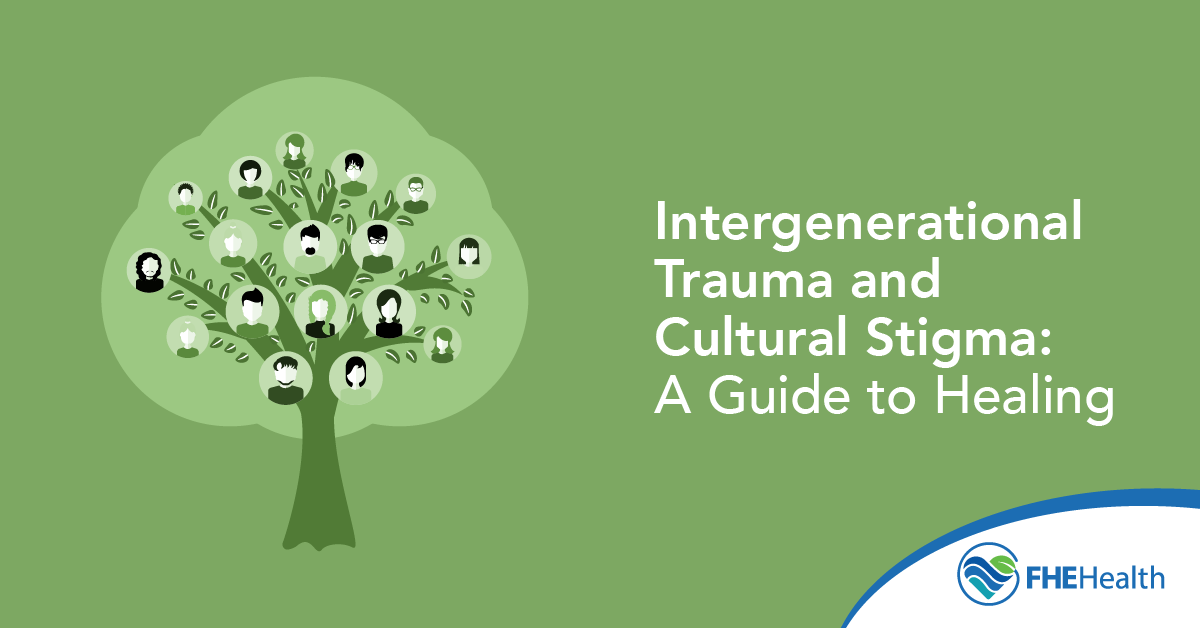
Today, many parts of the United States are cultural melting pots. People have the opportunity to travel and meet those from other cultures more easily than in previous generations. However, cultural differences and generational trauma can have a significant impact on a person’s mental health and their outlook on life. In this article, we’ll discuss intergenerational trauma and how cultural attitudes towards mental health can affect future generations.
What Is Intergenerational Trauma?
Intergenerational trauma is a term that describes how a trauma survivor might pass on their trauma to their descendants. Someone who’s experiencing intergenerational trauma might show symptoms that are similar to post-traumatic stress disorder, but they don’t have a specific traumatic memory they can point to as causing those symptoms.
For example, someone whose grandparents survived difficult or traumatic events may have parents who grew up in an environment that was repressive, controlling or hostile. The trauma the grandparents experienced might have caused them to be cold and volatile or frequently yell or shout at their children. Those children then grew up with limited ability to regulate their emotions and no role model to help them nurture their own children.
It’s this lack of support and role models that can lead to future generations continuing to pass on trauma. After a couple of generations, the memory of the original struggle is lost, but the emotional impact remains.
How Cultural Stigma Impacts Mental Health
Generational trauma is common in minority cultural groups and can have a lasting impact on a person’s mental and physical health. Mental health is a taboo topic in many cultures, and differences in attitudes towards health care, as well as institutional differences in how individuals are treated, can impact how likely it is that someone seeks help for their challenges.
If an individual feels they’re unlikely to be listened to or that they can’t describe their symptoms and fears to someone who’d understand them, they’re less likely to talk to a mental health professional. Attempting to cope with stress, anxiety or PTSD alone could increase the likelihood of a person turning to substance abuse or other self-destructive behaviors, further isolating them during a challenging time.
Signs You May Be Affected by Generational Trauma
Almost half of all children in the United States have had at least one adverse childhood experience. If those children don’t receive the support they need to process their negative experiences, they’re likely to pass on that trauma to their children. Some signs you might be affected by generational trauma include:
- Low self-worth
- Anxiety or depression
- A feeling of disconnection from your cultural background
- Nightmares or anxiety about historic traumatic events
- Difficulty forming or maintaining meaningful relationships
If you’re experiencing any of these symptoms, talking to a therapist could help you understand and process your feelings.
The Role of Cultural Identity in Healing
A person’s cultural identity shapes how they see the world. It’s the sum of that person’s beliefs, traditions, customs and values. Even someone who isn’t particularly traditional and doesn’t observe specific religious events or participate in major holidays might have acquired certain outlooks and attitudes from their parents and grandparents.
Those attitudes might manifest in mental health. For example, in a culture where seeking help for mental health struggles is stigmatized, therapists and counselors might need to take a different approach when supporting someone. This also applies to grief, stress and trauma. The way those challenges are viewed and the way a person might process those emotions could vary significantly depending on their background.
When a person’s cultural identity is respected during therapy, they’re more likely to engage with the process and make progress. A person who feels connected to their cultural identity and has support from their peers can build a stronger support network. They’re more likely to feel empowered and resilient and can build long-term coping strategies that will enable them to create a better future for themselves and their children.
Therapeutic Approaches and Community Support
Culturally sensitive therapy can help people from minority groups feel recognized and understood. This helps therapists and counselors build stronger connections with their clients. It also helps mental health professionals provide tailored treatments that are more closely aligned with the cultural groups they’re working with.
Reclaiming cultural pride isn’t something that happens overnight, though, especially if the culture in question is a minority one in a local area. However, helping people connect with peers and embrace their roots can put them in a better position to process trauma and recognize how it’s affecting them and those close to them.
Healing from generational trauma takes time, and a person may have to unlearn a lot of thought patterns and beliefs in the process. Healing doesn’t follow a linear path, but with community support and a culturally aware approach to therapy, skilled counselors can help set their clients up for increased chances of success.
Steps Toward Breaking the Cycle
Breaking the cycle of generational trauma begins with you and your loved ones. If you want to heal from intergenerational trauma, start by:
- Working with a therapist to identify and acknowledge your trauma
- Accepting your trauma and understanding that your ancestors were doing the best they could
- Learning to set boundaries with those around you
- Practicing mindfulness and other self-care strategies
- Connecting with others from your culture and from other cultures to build a support network
- Learning the skills you wish your parents had
- Accepting that no family is perfect and everyone makes mistakes
If you’re struggling with generational trauma, talking to a culturally sensitive therapist could help you put that trauma behind you and enjoy a healthier life. The team at FHE Health has experience in treating PTSD, anxiety, depression and people with dual diagnoses. Contact us today to speak to a trauma therapist in confidence and take the first step toward breaking the cycle.






